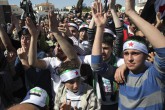The clouds of pessimism hanging over the Syrian crisis since March 2011 have begun to disperse in the last two months. Rather than questioning whether Assad will be overthrown, people are now wondering how Assad will step down and how post-Assad Syria will look like. After a bomb hit Assad’s inner security meeting on the 18th of July, the tide began to turn against the regime.High-ranking officers who were killed in that blast also took away regime’s immunity, the mutual trust of those in the regime’s inner circle and the loyalty of the army.
Several recent incidents prepared the grounds for the bombing. The first remarkable thing was the qualitative and quantitative increase in military defections. Until recently the number of the defectors was quite low and was not enough to shift the balance of power between the regime and the opposition. Some of the officers were afraid of the cost of their defections, as the opposition has claimed, because the Syrian regime was known for its use of torture on families of defectors. Furthermore, given its operations until very recently, the Free Syrian Army (FSA) did not seem to be worth running the risk to join its ranks. However, during this period, some factors contributed to the FSA’s consolidation, rendering it more powerful while increasing the number of military defections.
The Free Syrian Army is on the rise
The first factor is that the FSA was the only relatively organized armed group supporting the Syrian people against the regime as the international community remained a mere spectator. The FSA, which can be considered a franchise name, became the legitimate defender of the Syrian people during this period. Even those factions who kept their distance from the FSA began to cautiously get closer to it. Meanwhile, support by the opposition abroad for the FSA became one of its sources of legitimacy within the country.
During this period, the FSA established rebel-controlled zones throughout Syria. Though sometimes only temporarily, it established control over a number of areas in Homs and Hama, near the Turkish border in Aleppo and Idlib, and in the suburbs of Damascus. In this sense, it offered a place to go for those who were willing to leave the army. In other words, the opposition itself created the de facto buffer zone—which it had demanded for months—on a small scale. The FSA increased its armament with the help of weaponry it took from raided armories or bought from corrupt members of the Syrian army and aid from the Gulf countries.
In line with the threat that the strengthening FSA posed, the regime exacerbated the frequency of massacres. Clashes began to spread throughout Syria: raging in Homs, Idlib, Hama and Deir ez-Zor, spreading to Aleppo then to Damascus—the stronghold of the regime. Knowing that the regime will fall only if Damascus falls, opposition groups brought the conflict to the heart of Damascus and gave the message that nowhere in Syria is safe for the regime. Finally, the bombing it carried out reserved the seat for the FSA at a future negotiation table.
Minister of Defense Dawoud Rajiha was the only person on the ministerial level who died in the blast; however, his death was less significant than the death of other officers due to the crooked power pyramid of the regime. This is because Rajiha was only a figure head who was appointed in order to maintain the support of the Christian minority. On the other hand, the deaths of Bashar Assad’s brother-in-law Assef Shawkat, who had connections with foreign intelligence organizations, notably with Israel and U.S., Hisham Bakhtiyar, Syria’s connection with Iran, and Assad’s presidential advisor, Hasan Turkmani, constituted a great shock for the Baath regime and launched a new era in the regime-opposition conflict.
Russia’s exit strategy
Partly due to the bombing, countries like Russia that had given the Assad regime a blank check until now will now seek for initia
In this article
- Foreign Policy
- Opinion
- 2011
- Aleppo
- Assad Regime
- Bashar Al Assad
- Free Syrian Army
- Free Syrian Army (FSA)
- gulf
- Idlib
- Islamic Republic of Iran
- Israel
- Middle East
- Opposition
- Russia
- Syria
- Syrian Civil War
- Syrian Conflict
- Syrian Crisis
- Syrian Regime
- Syrian Revolution
- the mutual trust of those in the regimes inner circle and the loyalty of the army
- United States (US)

